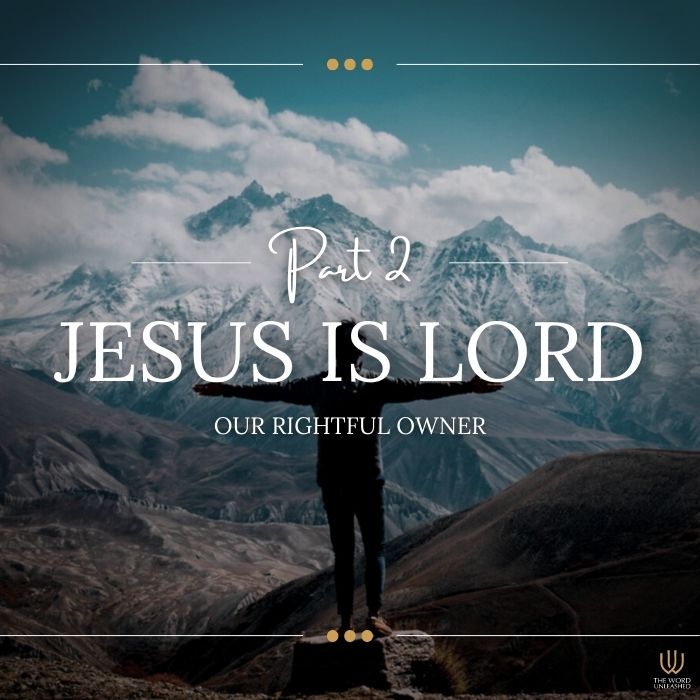
There are two important issues about the profound truth that Jesus is Lord that are worthy of our attention. Today, I would like to consider the first truth: its basic definition.
The Greek word for “Lord” is kurios. The leading Greek lexicon says that the primary meaning of kurios relates to “possession of power or authority.” So, this word deals with power and authority.
In the New Testament, kurios is used in three primary ways. First, it’s used to describe a master or owner of property. Furthermore, it denotes one who has authority because he owns something. For example, John Mark uses this word to describe an owner of a house (13:55). It is also used for the owner of a vineyard (Matt. 20:8), and for someone that owns a harvest (Matt. 9:38). Finally, It is even used for an owner of animals (Matt. 15:27). All these examples point to someone who owns something, therefore, he is the master over it. He, then, has the right to dispose of what he owns as he chooses.
A second sense of the New Testament word kurios is of any position of authority over someone else. This is someone who has authority, not because he owns something. Rather, because he has been placed in a position of authority. For example, the New Testament uses kurios to describe a father’s relationship to his children (Matt. 21:29). It’s used of a husband’s response and responsibility to his wife (1 Peter 3:6). It’s used of government officials in 1 Corinthians 8:5 and in Acts 17:14. And it’s used of Pilate (Matt. 27:63) and a Roman emperor (Acts 25:26).
Third, the most common use of the word kurios is for the master of slaves. For example, in Ephesians 6:5 where Paul is speaking to actual slaves in the congregation in the church of Ephesus, when he addresses them and their masters he uses the plural for kurios (masters).
When it comes to our relationship to Jesus Christ as our Kurios, this is the primary sense in which it’s used, the master/slave context. Jesus Himself explains this reality in John 13. On the night of Jesus’ betrayal at the Last Supper, Jesus washes the disciples’ feet for two reasons. First, to teach them the difference between having their souls bathed in justification, and having their feet washed in sanctification (ongoing confession and forgiveness). Second, to teach them a lesson about the menial service of one another. John 13:12–14 says, “So when He had washed their feet, and taken His garments and reclined at the table again, He said to them, “Do you know what I have done to you? You call Me Teacher and Lord; and you are right, for so I am. If I then, the Lord and the Teacher, washed your feet, you also ought to wash one another’s feet.”
Here, Jesus isn’t instituting a third ordinance in the church (baptism and communion being the other two). Rather, He’s teaching us a basic lesson: we are to be involved in the menial service of one another. If Jesus could take the position of the lowest slave and wash the feet of His disciples, then we ought to serve one another in such menial ways as well.
“Truly, truly, I say to you, a slave is not greater than his master, nor is one who is sent greater than the one who sent him.” This is the point: to say that Jesus is Lord is to say that I am His slave and He is my Master.” –John 13:16
Paul uses kurios the same way in Colossians 3:22 when he writes, “Slaves, in all things obey those who are your masters [kurios] on earth, not with external service, as those who merely please men, but with sincerity of heart, fearing the Lord [Kurios].”
Paul makes a stunning analogy. All of us who are followers of Jesus Christ are slaves of a heavenly Kurios. That’s the nature of the relationship we have with Christ when we confess Him as our Lord. Repeatedly in the New Testament, Jesus’ followers are called His slaves and He is called their Kurios. So, when you examine the word kurios and its use in the New Testament, the fact that Jesus is Lord means that He has the right to rule you and me.
Jesus is our rightful owner, because He made us and sustains us. He is the ultimate and highest authority in our lives. He is our Master, and we are His slaves. Let me just remind you that every person is a slave to something. Jesus said he who commits sin is the slave of sin (John 8:34). You’re either a slave of your sin or you’re a slave of Jesus Christ. This is what Scripture means when it says He is our Lord. He is our rightful owner, our ultimate authority, and He is our Master.